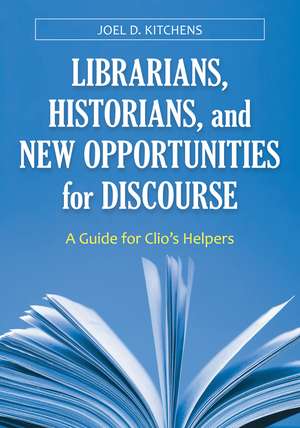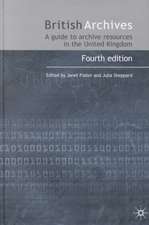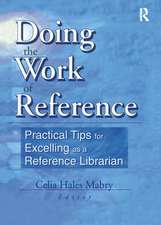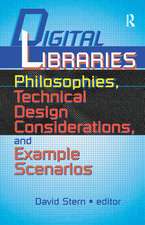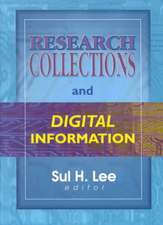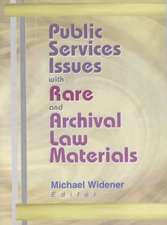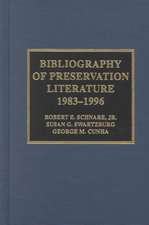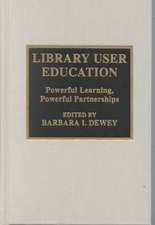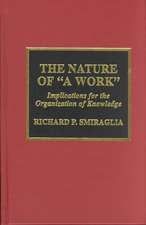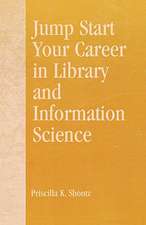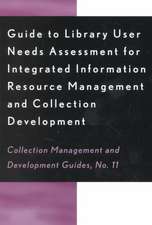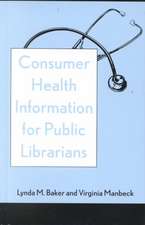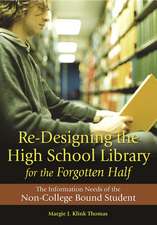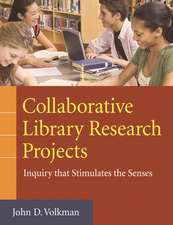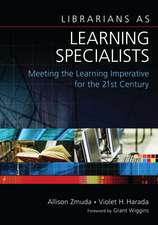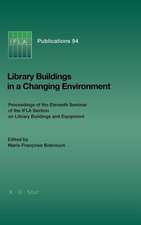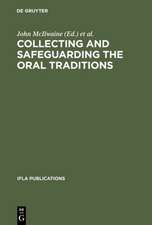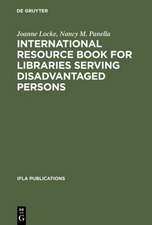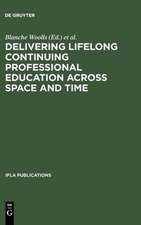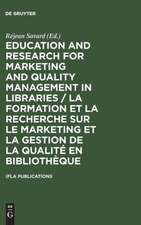Librarians, Historians, and New Opportunities for Discourse: A Guide for Clio's Helpers
Autor Joel D. Kitchensen Limba Engleză Paperback – 14 mai 2012 – vârsta până la 17 ani
Preț: 296.82 lei
Preț vechi: 413.40 lei
-28% Nou
Puncte Express: 445
Preț estimativ în valută:
56.79€ • 59.47$ • 47.11£
56.79€ • 59.47$ • 47.11£
Carte tipărită la comandă
Livrare economică 10-24 aprilie
Preluare comenzi: 021 569.72.76
Specificații
ISBN-13: 9781598846256
ISBN-10: 1598846256
Pagini: 136
Dimensiuni: 178 x 254 x 10 mm
Greutate: 0.3 kg
Editura: Bloomsbury Publishing
Colecția Libraries Unlimited
Locul publicării:New York, United States
ISBN-10: 1598846256
Pagini: 136
Dimensiuni: 178 x 254 x 10 mm
Greutate: 0.3 kg
Editura: Bloomsbury Publishing
Colecția Libraries Unlimited
Locul publicării:New York, United States
Notă biografică
Joel D. Kitchens is associate professor, humanities librarian, and subject specialist in history, art and architecture, and American studies for the Texas A&M University Libraries, where he has served since 1997.
Cuprins
Introduction1 Overview of HistoryBrief History of HistoryMajor Fields within HistoryMajor Research Methods UsedUse and Characteristics of Primary and Secondary SourcesScholarly Production: Books, Book Reviews, More Books, Scholarly Articles, and More Books!Emerging AreasOverlap with Other Areas in the LibraryConclusion2 Learning Your New LandscapeMaterials NeededWhat Is and May Not Be Available (the Truth Is Not Always Out There)Major Historians and Their Evolving MethodologiesContinuing EducationMentorshipLibrary Association DivisionsMajor Historical Societies and OrganizationsElectronic Discussion GroupsConferencesConclusion3 Getting to Know and Understand Your Local AudienceTalking to the Academic DepartmentMeeting Faculty on Their Own TurfWhat Are the Local Institution's Needs?Conclusion4 Reference Services and Access to MaterialGet to Know Your CollectionThe Reference InterviewCatalogs and CatalogingThe Reference CollectionMajor Indexes: Accessing Secondary Materials ElectronicallyOther Types of InformationArchival MaterialsPrinted Guides, Bibliographies, Encyclopedias, Landmark WorksReference on Location24/7 Reference (or Close to It)Conclusion5 Information Literacy for HistoriansThe History CurriculumHistory Components in Other DisciplinesBuilding Instructional PresentationsCollaborative Partnering on AssignmentsIntervention with the InstructorToo Much of a Good Thing?Conclusion6 Defining the History CollectionChallenges of History to Collection Development PoliciesDefining Scholarly and HistoricalTextbook ConsiderationsSerialsEvaluating Electronic Full TextMedia and Web-Based MaterialsMicroformsNewspapersConclusion7 Selection and Acquisitions ToolsBudget ConsiderationsBuilding a FoundationUsing Approval PlansReview SourcesGetting Prize BooksAssessing the CollectionPromoting the CollectionsOpen Stacks or Special CollectionsConclusion8 Maturing as a History LibrarianProgressive JourneySetbacksNavigating Departmental PoliticsIndicators of ProgressSharing Knowledge as a Senior Subject LibrarianConclusionReference List and Recommended ReadingsIndex
